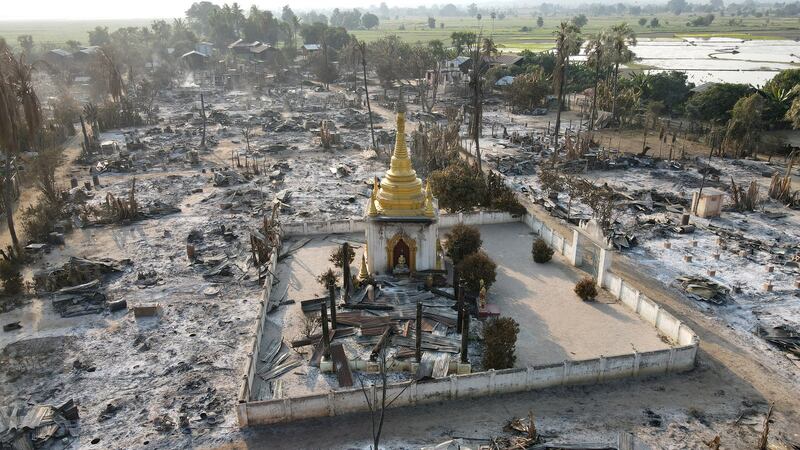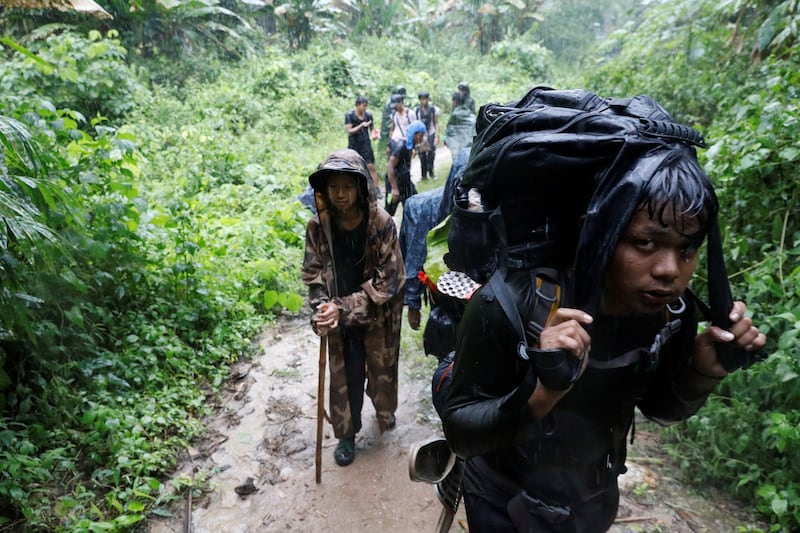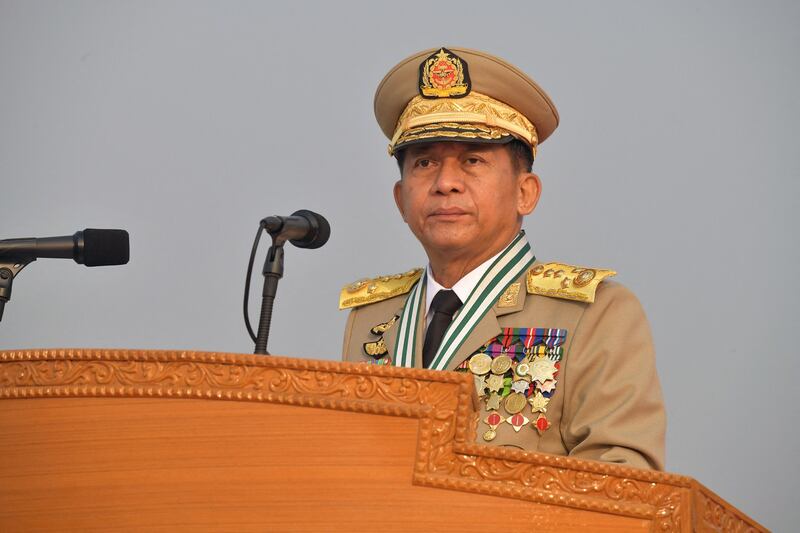Feb. 1 marked the second anniversary of the coup d’etat that ousted the democratically elected National League for Democracy government in Myanmar. Since then the country has descended into a multi-front civil war and lost over a decade’s worth of sustained economic growth. Over half of the population is living in poverty, driving people back into opium production, which saw 88 percent growth in 2022.
The military junta has failed to provide either security or basic social services. According to the Assistance Association for Political Prisoners, more than 2,890 people have been killed – but that doesn't include casualties in the border areas where fighting is fiercer. The military has detained nearly 17,500 since the 2021 coup, emptying jails of convicts to make room for political prisoners.
On the anniversary Wednesday, the military defied the constitution, and refused to hand over power to a civilian care-taker government after two extensions of its emergency decree, instead extending emergency rule for another six months. Constitutional niceties are a low priority for a blood thirsty military regime hell-bent on establishing a monopoly of power.
That they don’t have sufficient security to hand over power is telling. The opposition National Unity Government (NUG) has out-performed by every measure. The civil disobedience movement continues to stage demonstrations and flash mobs every day across the country.
The NUG led a second Feb. 1 "silent strike" to humiliate the regime. The shadow government has hundreds of affiliated people's defense forces (PDFs), which have tied the military down. They have done so with courage and technical innovation.
The generals in Naypyidaw should be very frustrated that they have not been able to terrorize the population into submission. The NUG clearly has legitimacy that they will never enjoy.

Nonetheless, the State Administrative Council, as the junta is formally known, has a five-part theory of victory, and believes that time is on its side.
First, the military will continue to wage a violent campaign across multiple fronts to wear down opposition forces through a war of attrition.
The violence will be excessive and intentionally target civilians. We have seen this play out most ferociously in Sagaing and Magway, where ethnic Bamar resistance is both new and threatens the military's long and vulnerable supply lines.
They will take advantage of the fact that the PDFs got over-extended in the rainy season, and have gone on the offensive with superior fire power now that the dry season has arrived.
Ramping up airstrikes
The junta will increasingly rely on artillery and air power. For the latter, the regime has increased their acquisitions, including buying five FTC-2000G and the first two of six SU-30s from China and Russia, respectively.
There's been over 360 percent increase in airstrikes over the previous year. Mostly the regime has targeted civilian communities, but recently there was an escalatory attack on Camp Victoria, the headquarters of the Chin National Front that killed five
New howitzers and multiple rocket launched systems imported from China will give the junta the ability to hit the NUG and its ethnic allies from a distance.
And of course the junta will try to terrorize the population into submission: nearly 40,000 homes have been set on fire throughout the country, 27,000 in Sagaing alone.
Second, the junta will assiduously target the shadow government’s funding and logistics.
The National Unity Government takes great pride that they have raised over $100 million through online sales of military-owned properties and crypto-bond offerings. They have used crypto currencies, tethered to the U.S. dollar to move money, and created digital wallets.

The junta has put officers in all banks to monitor any transaction over 100,000 kyat ($45), hampered mobile payments platforms, and at a more primitive level, physically inspects phones to see if they have the NUG Pay app. They have sentenced people to a decade for making token donations to the shadow government or its affiliated militias.
Third, the military will focus on the opposition’s center of gravity: their alliance with key Ethnic Resistance Organizations. This is both the shadow government’s greatest strength and greatest vulnerability. No Bamar-led government has had better ties with the ethnic forces than the NUG, whom they see as offering the best hope of establishing a democratic federal republic.
While some ethnic armies have supported the shadow government from the start, including arming and training their militias, many more have taken a wait-and-see approach. Some, particularly those in Shan State, such as the United Wa State Army, have benefitted from the status quo as they churn out record amounts of illicit narcotics.
The junta is determined to prevent more from joining the shadow government, and thereby opening up a new front. While there have been skirmishes with the Arakan Army, an all out war seemed to have been avoided, as the latter realized it gained more autonomy by not fighting.
Going after urban guerillas
Though the junta invites ethnic armies to Naypyidaw to resume the National Ceasefire talks, there are fewer takers. But this remains a line of effort. The military regime assumes that, at one point, historical mistrust will cause rifts between the NUG and the ethnic armies. Until then, it seeks to deter and induce the ethnic armies to withhold support for the National Unity Government.
Fourth, the junta will focus on decimating the urban guerrilla forces. The military was not surprised to be fighting a multifront war against the ethnic armies, even if the proliferation of people's defense forces caught them off guard. But the attacks by the Yangon and Mandalay urban guerrillas undermined their claim to have the situation under control in the eyes of the urban middle class, whom they desperately need to win over.
Urban guerrilla groups waged a systematic campaign in 2022, but their targets were often symbolic. There were only two operations that had real importance: the attempted assassination of the then-deputy head of the Central Bank of Myanmar and the killing of the CFO of MyTel, the largest and not coincidentally military-owned telecoms firm in the country.
But their attacks proved to be costly, with the importation of Chinese CCTVs and facial recognition software.

Fifth, the junta will hold “elections” by August, in an effort to legitimize their rule, taking a page out of the playbook written by Thailand’s generals in 2019.
They have announced the establishment of proportional representation, and the military will still receive 25 percent of parliamentary seats. Districts are being gerrymandered and the military controls the voter lists. The Union Election Commission has been purged of all pro-National League for Democracy figures, and is fully controlled by the military.
Over 1,100 NLD officials are imprisoned and many have been tortured to death.
The newly announced election law cripples the political opposition and allows the Union Election Commission to dissolve parties if it is declared unlawful or it has communications with "terrorist" organizations, doesn't have offices or run candidates in 50 percent of the 330 townships; or compete in by elections, isn't registered and has 100,000 listed members, or doesn't deposit 100 million kyat ($43,727) at the military-owned Myanma Economic Bank.
While not everyone in the junta is convinced about the utility of elections, including Soe Win, Min Aung Hlaing believes they are the source of the regime’s legitimacy, especially in the eyes of the international community, many of whom will view even shambolic elections as “good enough”.
The military believes that time is on its side, and given the lack of concrete international support for the National Unity Government, and they might be right. The stakes are high for both sides, as we enter year three of a conflict that continues to drag Myanmar back to amongst the poorest and most unstable countries in the world.
Zachary Abuza is a professor at the National War College in Washington and an adjunct at Georgetown University. The views expressed here are his own and do not reflect the position of the U.S. Department of Defense, the National War College, Georgetown University or RFA.
